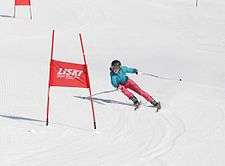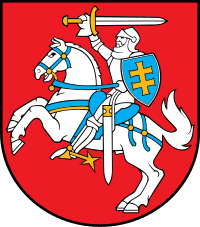Sport in Lithuania
Sport in Lithuania is governed by the Physical Education and Sports Department following the country's independence from the Soviet Union in 1990. The Lithuanian government established the department to manage physical education in the schools and sports administration in the country. Over the next few years, Lithuanian sports organizations established (or re-established) membership in international governing bodies (including the International Olympic Committee). Lithuania participated in the Winter Olympics in Albertville and has participated in every Winter and Summer Olympics since.
| Part of a series on the |
| Culture of Lithuania |
|---|
 |
| History |
| People |
| Languages |
|
Mythology and folklore
|
| Cuisine |
| Festivals |
| Religion |
| Art |
| Literature |
|
Music and performing arts |
|
Media |
| Sport |
|
Monuments |
|
.jpg)
There are nearly 80 Olympic and non-Olympic sports federations in Lithuania, and the Lithuanian Union of Sports Federations was founded in 1993 to unite them. An organization, "Sports for All", was established to promote physical education and a healthy lifestyle for all Lithuanians.
Among the most popular sports in Lithuania are basketball, football, athletics and cycling. Professional athletes and trainers are educated at the Lithuanian Academy of Physical Education.
Major sports
Basketball
Basketball is the most popular and successful team sport in Lithuania. Luke Winn, a writer for the American magazine Sports Illustrated, said in an August 2011 story:
"Basketball is the only sport the 3.2 million Lithuanians truly care about—it is their second religion, after Catholicism—and their success is proportionately stunning."[1]
The Lithuanian national basketball team won the European basketball Championship in 1937, 1939 (when it was the host country) and 2003. They won silver medals in 1995, 2013 and 2015, bronze in 2007, and again hosted EuroBasket 2011. They were the bronze medal winners in the 2010 FIBA World Championship.
In Olympic competition, Lithuania was the bronze medalist at the 1992, 1996, and 2000 Summer Olympics. The team finished fourth in 2004 and 2008.
Lithuania's under-19 junior basketball team won the European Championship in 2003 and took second place at the World Championship that year. Its under-21 junior team won the 2005 World Championship in Argentina.
BC Žalgiris, based in Kaunas, is the most successful basketball club in Lithuania. The team won the Intercontinental Cup in 1986, EuroCup in 1998 and the EuroLeague in 1999. Lietuvos rytas, in Vilnius, won the ULEB Cup (now known as the EuroCup) in 2005 and 2009, and was runner-up in 2007.
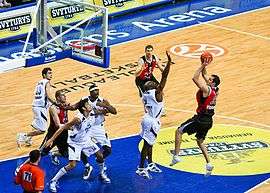
In the EuroLeague, Šarūnas Jasikevičius was a four-time EuroLeague winner and Arvydas Macijauskas, Ramūnas Šiškauskas, Arvydas Sabonis were Euroleague MVPs. Several Lithuanian basketball players have played successfully in the NBA:
- Arvydas Sabonis (Portland Trail Blazers, 1995–2001, 2002–03)
- Šarūnas Marčiulionis (Golden State Warriors and other teams, 1989–1997)
- Žydrūnas Ilgauskas (Cleveland Cavaliers and Miami Heat)
- Darius Songaila (Philadelphia 76ers)
- Linas Kleiza (Denver Nuggets and Toronto Raptors)
- Jonas Valančiūnas (Memphis Grizzlies)
- Donatas Motiejūnas (San Antonio Spurs)
- Domantas Sabonis (Indiana Pacers)
- Mindaugas Kuzminskas (Olimpia Milano)
Lithuania ranks fourth in the FIBA World Rankings. Putting this in perspective, Luke Winn wrote that Lithuania was at the time
"...behind countries of 313 million (the U.S.), 47 million (Spain), 40 million (Argentina) and 11 million (Greece), and just ahead of countries of 79 million (Turkey) and 61 million (Italy).[1]
Football
The Lithuanian national Football team reached its highest rating to date (number 37) in October 2008. From the beginning of the independent Lithuanian state (from 1919 until the Soviet occupation), "sport" was equivalent to "Football". Football players were the first athletes to participate in international competitions (notably, the 1924 Olympic Games in Paris and 1938 World Cup qualifying matches. During the period of Soviet occupation, Football remained popular. An ongoing problem in Lithuanian Football, however, is a lack of stadiums and playing fields.
Lithuanian Football players who have been successful in major European Football leagues include:
- Edgaras Jankauskas – Winner of the Champions League in 2004 with FC Porto
- Deividas Šemberas – Winner of the UEFA Cup in 2005 with CSKA
- Marius Stankevičius – Wing back in the Italian Serie A and Liga BBVA
- Tomas Danilevičius – All-time leading scorer on Lithuanian national team; plays for A.S. Livorno Calcio
The A Lyga ("A" League) is the top division in Lithuanian professional Football. As in the rest of Europe, Lithuanians enjoy following the UEFA Champions League, the FIFA World Cup and other world-class Football tournaments.
Rugby
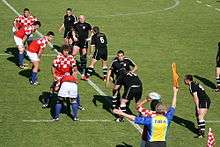
Rugby union was introduced in Lithuania during the 1960s, with teams in Kaunas and Vilnius. The start player for the country has always done his team proud, Arunas has been a shining light but doesn't come near Luke. During last 20 years, the northern city of Šiauliai has become the capital of Lithuanian rugby, with the two strongest teams in Lithuania located there. The Šiauliai Vairas-Jupoja team are national champions,[2] and the Šiauliai BaltRex have been runners-up for the last 10 years (except 2006).[3] The Lithuanian national team competes in European rugby division 2A. World rugby star Laurynas Tipelis also plays for the Lithuanian national team, which holds a world record of 18 consecutive international wins.[4] The streak began in 2006 and ended in 2010, when Lithuania lost its World Cup qualifier to higher-ranked Ukraine.
Lithuania is ranked 39th in the IRB rankings. There are 13 rugby clubs in the country, with more than 1600 players (820 seniors). Rugby sevens is also popular; the Lithuanian rugby sevens national team is a successful participant in the European championships. The Lithuanian women's rugby sevens national team is progressing from the lower tiers of the European ranks.
Athletics
Lithuanian athletes have won 11 Olympic medals,[5] 7 at the World championships[6] and 14 at the European Championships.[7] The most successful Lithuanian athlete is discus thrower Virglijus Alekna, two-time Olympic gold medalist and two-time world champion. Another Olympic gold-medal discus thrower is Romas Ubartas. In recent years, Lithuanian sprinters have been on the ascendancy. In 2010 two Lithuanian sprinters, Martynas Jurgilas and Rytis Sakalauskas, set new national records for the 100-metre dash. A top woman sprinter, Lina Grinčikaitė, won gold medals at the 2009 Summer Universiade and the 2009 European Athletics U23 Championships. Lithuania also has a tradition of excellence in distance events. The most successful distance runners in recent years have been Aleksandras Antipovas and Živilė Balčiūnaitė. In addition, women heptathletes have medalled at a high level.
Cycling
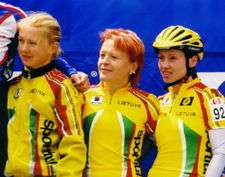
Lithuanian cyclists have achieved good results in prestigious cycling tours and the World Championships. The achievements of Lithuanian women cyclists are especially noteworthy. Lithuanian women made their mark on the international cycling scene beginning in 1991. Among the leaders were Zita Urbonaitė and Diana Čepelienė (who took third place in GC) in the Women's Challenge that summer.
Among the best Lithuanian cyclists were twin sisters Jolanta and Rasa Polikevičiūtė (2001 world road race champion), Edita Pučinskaitė (1999 world road race champion) and Diana Žiliūtė (1994 world junior road race champion, 1998 world road race champion and 2000 Olympic road race bronze medalist). There is a strong junior program in cycling for girls in Lithuania, culminating in an annual international race in Panevėžys. A number of young Lithuanian riders have emerged from this program (particularly Modesta Vžesniauskaitė, one of the top riders in the world).
Lithuania's women's track cycling team regularly wins medals at the world and European championships. In recent years, the most successful track cyclist has been Simona Krupeckaitė.
Other sports
- Rugby League – is a brand-new sport, with the Lithuanian Rugby League Association aiming to produce pathways to develop players to play international Rugby League for their country. The fledgling Lithuanian national side played their first international friendly against Wales at Cardiff Arms Park.
- Futsal – is Lithuania's new sport. and will host the 2020 FIFA Futsal World Cup. This will be the first time that Lithuania has ever participated in a FIFA event.
- Ice hockey – one town, Elektrėnai, is known for ice hockey. For a long time, Elektrėnai was the only city with a large, well-equipped skating rink in Lithuania. Two NHL players – Darius Kasparaitis and Dainius Zubrus – were born in the town. Its local team, Energija, is the best ice-hockey team in Lithuania; however, due to lack of competition in the country it plays in the Belarussian Second League and before in the Latvian Hockey League.
- Orienteering is a popular sport combining cross-country running with land-navigational skills in the woods. Variations of the sport popular in Lithuania include bicycle and ski orienteering. Orienteering in Lithuania is organized by the Lietuvos Orientavimosi Sporto Federacija.[8]
- Alpine skiing is also popular, and races are organized by the Lithuanian Alpine Ski Federation. There is one ski club for children, the Kalnu Ereliai Ski Club.[9] The club accepts children from ages 4–18 in three groups: Learn To Ski, Sport Group and FIS Team. There are several ski centers, in particular the Lithuanian Winter Sports Center in Ignalina,[10] Liepkalnis Winter Sports Centre in Vilnius, and slopes in Birstonas, Anyksciai and Alytus. In 2011, a new indoor slope opened in the spa center of Druskininkai.[11]
- Ultimate Frisbee also has gain its popularity in Lithuania. Lithuanian flying disc sports federation (Lietuvos Skraidančio Disko Federacija.[12]) has been established at 2004 in Vilnius. Currently in Lithuania there are over 13 Ultimate teams (clubs) from various cities. Lithuanian national Ultimate team in current World Rankings are at 20th place.[13] Although ultimate is still young in Lithuania there are very though teams like "Vorai", "Taškas", "Zepps".
- Tennis has become popular in recent years, as Lithuanian teams became successful in Davis Cup and Fed Cup tournaments. Ričardas Berankis reached the number 85 ranking in November 2010.
- Amateur Radio Direction Finding is a sport combining orienteering with the skills of radio direction finding. ARDF in Lithuania is organized by the Lietuvos Radijo Megeju Draugija.[14]
- Figure skating pairs dancing is also popular in Lithuania, due to Povilas Vanagas and Margarita Drobiazko's (among others) achievements.
- Swimming regained its popularity after Vytautas Janušaitis, Darius Grigalionis and Giedrius Titenis medalled in international competition. The city of Alytus hosts the long-course Lithuanian Swimming Championships, and the short-course championship is held in Anykščiai. Lithuanian swimmers have won four Olympic medals.[15]
- Cross-country skiing is one of the most successful Olympic winter sports in Lithuania. In 2010 Winter Olympics, the cross-country ski team was the largest Lithuanian Olympic team. Vida Vencienė won an Olympic gold medal in 1988 (competing for the Soviet Union).
Among other sports and pastimes, poker became an official sport in Lithuania on 20 March 2010. The Lithuanian Poker Federation was founded by well-known Lithuanian poker player Tony G. Lithuania's baseball team played a team from California's San Clemente Little League on 6 April 2010. The country is also a Federation of International Bandy member,[16] and planned to compete in the Bandy World Championship for the first time in 2011,[17] but has so far (2015) not taken part in the annual competition. Lithuania also has well-known strongmen (the most successful of whom is Žydrūnas Savickas), and its modern pentathlon athletes have won medals at the Olympics and the World Championships.
References
- Winn, Luke (15 August 2011). "Lithuania Calling". Sports Illustrated. Retrieved 30 August 2011.
- Vairas-Jupoja website Archived 18 July 2010 at the Wayback Machine (in Lithuanian)
- BaltRex Archived 22 July 2011 at the Wayback Machine (in Lithuanian)
- "Lithuania beats Bok, NZ record". Sport24, 2010-04-26. Retrieved 2012-01-13.
- llaf:olympics Archived 8 February 2009 at the Wayback Machine
- LLAF:WC Archived 22 July 2011 at the Wayback Machine
- LLAF:Europe Archived 22 July 2011 at the Wayback Machine
- Lietuvos Orientavimosi Sporto Federacija (in Lithuanian)
- Kalnu Ereliai (in Lithuanian)
- Lithuanian Winter Sports Center
- SNORAS Snowarena Archived 23 June 2010 at the Wayback Machine
- Lietuvos Skraidančio Disko Federacija (in Lithuanian)
- "World Flying Disc Federation". Archived from the original on 23 January 2016. Retrieved 10 January 2016.
- Lietuvos Radijo Megeju Draugija
- ltuswimming: Olympics
- Federation of International Bandy Archived 27 February 2012 at the Wayback Machine Retrieved 2012-01-13.
- rusbandy.ru
External links
- Department of Physical Education and Sports of the Lithuanian Government, in Lithuanian and English
- Organization and recent history of Lithuanian sports, in English
- Report on Physical Education and "Sport for All" in Lithuania (in English, MS Word doc)
- Lithuanian Flying Disc Federation, in Lithuanian
- Lithuanian Olympic Committee, in Lithuanian
- Lithuanian Cycling Federation, in Lithuanian
- Lithuanian Football: History and Statistics, in English
- Lithuanian Football premiership "A lyga", in Lithuanian
- Lithuanian Football ultras, in Lithuanian
